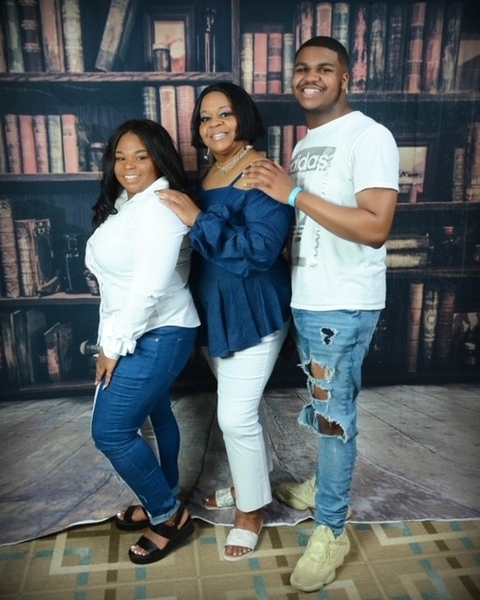Black, Hispanic, and Indigenous people in America have the highest rates of asthma, hospital visits, and asthma-related deaths. Black people are three times more likely to die from asthma compared to white people. And many of these deaths could be prevented.
The Asthma and Allergy Foundation of America (AAFA) recently spoke with Kimberly Spencer-McLeod, Executive Director and founder of the Aja Forever Foundation, to learn more about her advocacy for health equity and raising awareness about asthma in her community.
About Kimberly D. Spencer-McLeod
 Kimberly D. Spencer-McLeod is the Executive Director and founder of the Aja Forever Foundation. Her hands-on life experience raising, caring for, and mothering two children with asthma, sleepless nights, many trips to the hospital, and countless hospital admissions are the driving force behind her mission.
Kimberly D. Spencer-McLeod is the Executive Director and founder of the Aja Forever Foundation. Her hands-on life experience raising, caring for, and mothering two children with asthma, sleepless nights, many trips to the hospital, and countless hospital admissions are the driving force behind her mission.
Kimberly was introduced to asthma at an early age in her home with two brothers with asthma. She would encounter asthma again with her two children, Aja and Zion. Although overwhelmed at times, she poured her life into educating herself on the asthma triggers of her children. Due to the severity of Aja‘s asthma, she understood strong advocacy was necessary.
When Aja died from asthma at age 22, Kimberly turned her passion into action to form the Aja Forever Foundation. Kimberly is dedicated to keeping Aja’s legacy alive by sharing her life while dedicating herself to families and communities worldwide to bring true awareness and attention to asthma.
Kimberly has seen the effects of asthma all her life – first with her two brothers and later with her children. But nothing prepared her for Aja’s death from asthma two weeks after she graduated from Bowie State University. Aja’s death is the motivation behind her mission.
“Although my heart will ache forever, sharing my story offers a voice of clarity about my daughter‘s struggles, joys, and survival, as well as hope and help to those living with asthma daily,” Kimberly said. “It also dispels the myths associated with asthma and provides context for how a situation can change drastically with someone with asthma, even resulting in death. I am passionate about educating, encouraging, and empowering with compassion and care. Lastly, it provides a safe space to breathe for those who need support during some of their most challenging asthma encounters.”
Through the Aja Forever Foundation, Kimberly spreads awareness about asthma and its impact on individuals, families, and communities. In an effort to turn pain into purpose, Kimberly’s advocacy has helped bring the patient and family voice into her educational presentations and outreach. She also has a passion for providing emotional support to individuals and families living with asthma.
Educational awareness events and speaking engagements are one way Kimberly is active in her community. She enjoys sharing her personal experience with school staff, nurses, and other medical professionals. She offers compassionate and practical tips to help people manage asthma. You can also find her working with day care providers, churches, families, and other people who need hands-on asthma education awareness and support.

“Education is key to communities worldwide, and providing resources for improving quality of life could start the conversation,” Kimberly shares. “What is needed? How can we help the asthma community understand triggers and effects? How can we improve access to resources and get more providers? These are all vital pieces to ending disparities.”
Asthma outcomes in communities of color have not improved much at all during the past several years. Kimberly is committed to using Aja’s voice to do what she can for better health equity.
“We should all be treated equally not according to your race or status. None should lack access to health care. I have been on the side of medication denials or been financially strapped and desperate to get help for my daughter. My passion is to speak out so that all have the opportunity to be treated fairly and receive the resources needed to survive. There should not be a noticeable difference between what one person with asthma receives versus another.”
Learn more about the unequal burden of asthma on Black people in the U.S. in AAFA’s Asthma Disparities in America report.
How Can You Help Reduce Asthma and Allergy Disparities?
The only way we can reduce health disparities is if we all work together. Everyone – from people with asthma and allergies to policymakers and the health care industry – can be a part of building programs that make a lasting difference for people, families, and communities impacted by asthma and allergies.
Sign up for AAFA’s community to stay up to date about the following opportunities to get involved:
- Advocate for people affected by asthma disparities
- Participate in patient-centered research and clinical trials
You can also donate to support AAFA’s mission to create real and lasting change.



Comments (1)